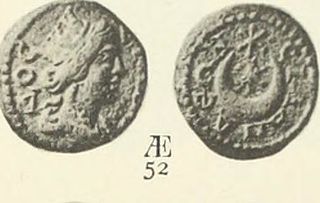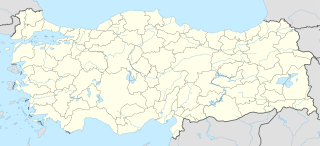Related Research Articles

Aulus Gellius was a Roman author and grammarian, who was probably born and certainly brought up in Rome. He was educated in Athens, after which he returned to Rome. He is famous for his Attic Nights, a commonplace book, or compilation of notes on grammar, philosophy, history, antiquarianism, and other subjects, preserving fragments of the works of many authors who might otherwise be unknown today.

Sir William Mitchell Ramsay, FBA was a Scottish archaeologist and New Testament scholar. By his death in 1939 he had become the foremost authority of his day on the history of Asia Minor and a leading scholar in the study of the New Testament.
Grattius Faliscus was a Roman poet who flourished during the life of Augustus. He is known as the author of a Cynegeticon, a poem on hunting.
Mossyna or Mosyna (Μοσύνα) was a city of the middle Maeander valley in the late Roman province Phrygia Pacatiana II. It is mentioned as a bishopric by Hierocles and other ecclesiastical writers. It may have been named for the classical Mossynoeci. Or for the Greek word for tower made of wood (Μοσσύν).

Tripolis on the Meander – also Neapolis, Apollonia, and Antoniopolis – was an ancient city on the borders of Phrygia, Caria and Lydia, on the northern bank of the upper course of the Maeander, and on the road leading from Sardes by Philadelphia to Laodicea ad Lycum. It was situated 20 km to the northwest of Hierapolis.
Savatra, Sabatra, or Soatra was a city in the Roman province of Galatia, and subsequently the Byzantine province of Lycaonia.

Silandus or Silandos was an episcopal city in the late Roman province of Lydia. It was near and gave its name to the present town of Selendi in Manisa Province, Turkey.
Temnos or Temnus was a small Greek polis (city-state) of ancient Aeolis, later incorporated in the Roman province of Asia, on the western coast of Anatolia. Its bishopric was a suffragan of Ephesus, the capital and metropolitan see of the province, and is included in the Catholic Church's list of titular sees.
Emporius was a Roman Latin rhetorician and the author of three short tracts titled De Ethopoeia ac Loco Communi Liber, Demonstrativae Maleteriae praeceptum and De Deliberatia Specie. He is believed to have flourished not earlier than the sixth century, chiefly from the circumstance that he refers in his illustrations to the regal power rather than to the imperial dignity, which he would scarcely have done had he lived before the revival of the kingly title.
Eucolpius or Encolpius was an Ancient Roman writer of the third century. He is named by Lampridius as the author of a life of the emperor Alexander Severus, with whom he lived upon terms of intimacy.
Epagathus was an Ancient Roman politician of the early third century.
Thebasa was a fortified place in Asia Minor in Classical Antiquity that was noted by Pliny as a city of ancient Lycaonia, situated in Tauros.
Daldis, was a town on the borders of ancient Lydia and Phrygia, a former bishopric, and is now a Latin Catholic titular see. It also minted coins in antiquity with the legend Δαλδιανων. It also bore the name Flaviocaesaria or Phlabiokaisareia, which is not attested among ancient authors but is reconstructed from epigraphic and other evidence.

Apollonos Hieron was an ancient city of Lydia.

Tabala, is the name of a Roman and Byzantine town and a Bishopric in ancient Lydia. Tabala was on the Hermus River, and minted its own coins. It is no doubt the same as the one mentioned by Hierocles under the name of Gabala, which is perhaps only miswritten for Tabala. It is even possible that it may be the town of Tabae or Tabai (Τάβαι), which Stephanus of Byzantium assigns to Lydia.

Isaura Palaea, in Latin Isaura Vetus, both meaning 'Old Isaura', and perhaps identical to Isauropolis, was a Roman and Byzantine era town in southern Turkey. The city has been identified with modern Zengibar Kalesi near Konya.

Isaura Nea, in Latin Isaura Nova, both meaning 'New Isaura', was a town of the Roman and Byzantine era, so called in juxtaposition with the settlement of Isaura Palaea. It also bore the name Leontopolis, and in later days was included in the province of Lycaonia.
Maionia or Maeonia, was a city of the Hellenistic, Roman and Byzantine era located near the Hermos River, in ancient Lydia. Both Ramsay and Talbert tentatively identified the ancient polis with the modern village of Koula a village known for its carpet manufacture.
Aurokra or Aurokla or Aurocla or Aulokra was a town of ancient Phrygia, inhabited during Roman and Byzantine times. It became a bishopric; no longer a residential bishopric, it remains, under the name Aurocla, a titular see of the Roman Catholic Church.
Dioclea, Dioclia, Diocleia, or Diokleia was a town of ancient Phrygia, inhabited during Roman and Byzantine times.
References
-
 This article incorporates text from a publication now in the public domain : Ramsay, William (1870). "Empylus". In Smith, William (ed.). Dictionary of Greek and Roman Biography and Mythology . 2. p. 14.
This article incorporates text from a publication now in the public domain : Ramsay, William (1870). "Empylus". In Smith, William (ed.). Dictionary of Greek and Roman Biography and Mythology . 2. p. 14.